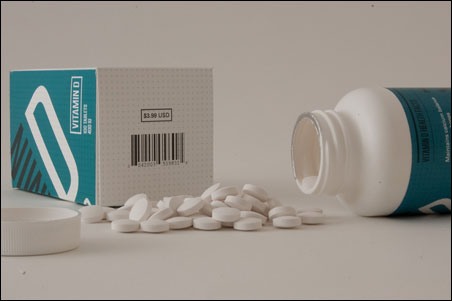Vitamin D supplements have no effect on knee osteoarthritis, study finds
Vitamin D supplements have no effect on knee osteoarthritis, study finds
Few supplements have been promoted as relentlessly and breathlessly as vitamin D.
Taking vitamin D supplements does not reduce the pain nor slow the progression of knee osteoarthritis, according to a study published Wednesday in the Journal of the American Medical Association (JAMA).
This finding offers yet more evidence that the past decade’s hype about vitamin D has been overblown. Just a couple of months ago, for example, researchers reported in another well-designed JAMA study that vitamin D supplementation has no effect on the common cold or other upper respiratory tract infections.
As I’ve noted here before, few supplements have been promoted as relentlessly and breathlessly as vitamin D. Claims have been made that taking the supplement will protect against all sorts of ailments, from headaches to heart disease.
But those claims are almost always based on observational studies, which can suggest only a correlation, not a cause-and-effect, between two things. To prove that one thing causes another — say, that vitamin D supplementation prevents the progression of knee osteoarthritis — scientists must conduct clinical trials in which people are randomly assigned to receive either a treatment or a placebo.
Study details
That’s what researchers from Tufts University in Boston did for the new JAMA study. They recruited 146 people (average age: 62) with osteoarthritis of the knee. Each was randomly assigned to receive either a placebo or 2,000 international units (IUs) of vitamin D supplements daily — an amount that far exceeds the 600 to 800 IUs currently recommended. That amount was raised even further in the study if a participant’s blood levels of vitamin D did not reach 36 ng/mL, a level that prior studies had suggested was clinically significant.
The participants were followed for two years. They were periodically assessed for pain and loss of cartilage in the knee.
By the end of the study, 61.3 percent of the participants in the treatment group had reached the blood level goal of 36 ng/mL compared to only 8.3 percent in the placebo group. Yet there was no significant difference in either pain or cartilage loss between the two groups. Both groups lost about 4 percent of cartilage volume. Interestingly, reported knee pain decreased slightly in both groups (a finding that suggests the placebo response may have been at work).
Few need supplements, say experts
This study, like all studies, has limitations. The number of participants was relatively small, for example, and they were followed for only two years. Perhaps a longer study would produce different results.
So far, however, the only proven health benefit from vitamin D supplementation is stronger bones. But even then, the vast majority of us do not need to take supplements to get enough of the nutrient. According to the Institute of Medicine (IOM), most Americans under the age of 70 need no more than 600 IUs of vitamin D daily to keep their bones healthy. That amount seldom requires supplementation, the IOM experts add. Most people — including us northern-latitude-dwelling Minnesotans — get plenty of vitamin D from our food and from natural sunlight
 .
.
Add new comment